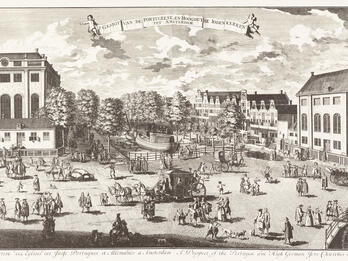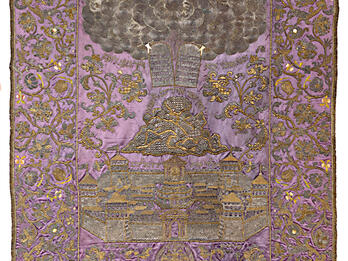Ve-lo ‘od ela’ (Moreover): On the Earthquake in Smyrna
Now since the episode of the earthquake has already been mentioned, in order that all those who come after us should be aware of it, I shall place on record what occurred in relation to the earthquake in the city of Izmir [Smyrna], may the Almighty shield it from harm—in the year 5448 from the Creation, in the month of Tammuz, on the holy Sabbath day, at a time when the entire House of Israel were in their homes after the morning meal—there was heard, all of a sudden, the sound of a great and mighty tremor lasting as long as the time required to roast an egg, the like of which has never been experienced in our own generations, and indeed our ancestors never told us of such a thing, the force of the earthquake so great that it toppled every lofty fortress to the ground, and the houses were destroyed, and about four hundred Jewish people perished beneath the walls, the majority of whom were men of piety and good deeds, and at their head was the great rabbi, our teacher R. Aaron ibn ḥayim, may the memory of the righteous be for a blessing—this being on account of our many iniquities. [ . . . ]
And in regard to the gentiles who perished, their number is not known as there were so many fatalities; and all the idolatrous temples [i.e., churches] as well as all the mosques of the Arabs fell down. But no harm occurred to the synagogues and to the houses of Torah study, with the exception of just two. And at that very time, after the quake, fire fell down from the heavens in the area inhabited by the Christians, and it devoured its foundations; and praise be to God, blessed be He, the fire did not reach the Jewish area, though, for fear of the fire and the continuing aftershocks of the quake, the remaining survivors fled to the mountains, and the Jewish community was scattered on that Sabbath day—a few men here and a few there—upon the mountains and the hills and over the fields; and some of them went by foot to the coast and some traveled there by boat, and they suffered there from heat by day and frost by night, and they left their homes and their possessions just as they were, as they were afraid to try to find anything, in case one of the walls might fall down on them.
And after this, some men arose and would walk around in the evening, exposing themselves to danger, and they would enter the houses buried beneath the ruins to plunder and steal everything on which they could lay their hands; and when the owners came searching for the dead in order to bury them, one would weep over his dead while another would bewail the loss of his home, as he would be unable to find even a flask of oil, for the plunderers had taken everything they could.
And it is our duty to praise the Lord, for all the dead of Israel were able to receive burial, and even as regards those who had been burned, the searchers found their bones and buried them, apart from two or three individuals whose place of residence was not known. However, a grievous scenario ensued, in that the corpses began to reek, and virtually all of them were found in a state comprising severed body parts; and on this account the grave-diggers would bury them five or six in one grave, as the souls of those carrying out the burials became impatient by reason of the stench, and nowhere was one grave left for each individual corpse. And what is more, they were virtually reduced to digging out the graves with wooden implements or with bones, since their tools that had been prepared for the digging remained beneath the ruins and could not be found. May the Lord duly recompense all those who involved themselves therein, in that they occupied themselves with their burial; and, even more so, for having placed themselves in danger by searching for the corpses beneath the walls.
Now the tremors did not cease either by day or by night, and after the great earthquake mentioned above, another huge quake occurred eight days later, and likewise, some of the buildings that had survived fell down; and furthermore, after thirty days, yet another great earthquake occurred, close in its intensity to the original quake, in which one Jewish individual perished. When the inhabitants of the city witnessed this, fear and trembling entered their hearts, and the majority of them prepared to leave and went to other countries. [ . . . ] The length of time during which they remained dispersed was four months; for after four months, each individual began to prepare a home for the winter season, and despite the fact that the tremors had not ceased, they nonetheless busied themselves with some sort of repair of the buildings—for the tremors were now weaker—and the tremors continued like this for six months.
Now you should know, esteemed reader, that throughout the duration of the earthquake, there arose men who were declaring, as though by way of prophecy: “At such-and-such times there will be huge fresh earthquakes and renewed destruction and a wind bringing raging heat in its wake.” And, on hearing this, the population whose hearts were already as soft as wax, smote one against the other, and, for fear, they hastened to flee far away before the predictions came to pass. But lo and behold! It was all nonsense and false prophecy, for nothing of all that they had said actually occurred: neither all nor any part of it. On the contrary, there were periods of such calm the like of which had not been experienced since the onset of the earthquake. [ . . . ] You should also know that, during the time of this earthquake, a grievous disease erupted, from which many of the gentiles died; and of the Jewish people too, a greater number perished than had died in the earthquake. And—even at the time when I was writing all this—they were still continuing to die, on account of their iniquities, and this situation will prevail until such time as the Almighty sends His word and heals them, and removes His burning indignation from Israel. Amen in perpetuity, for ever and ever!
Translated by
.
Credits
Elijah ha-Kohen ha-Itmari, “Ve-lo ‘od ela’ (Moreover): On the Earthquake in Smyrna” (manuscript, Izmir, ca. 1688). Published as: Elijah (ben Solomon Abraham) ha-Kohen ha-Itmari, Ve-lo ‘od eleh (Izmir: Ashkenazi, 1853), pp. 167b–168b.
Published in: The Posen Library of Jewish Culture and Civilization, vol. 5.




